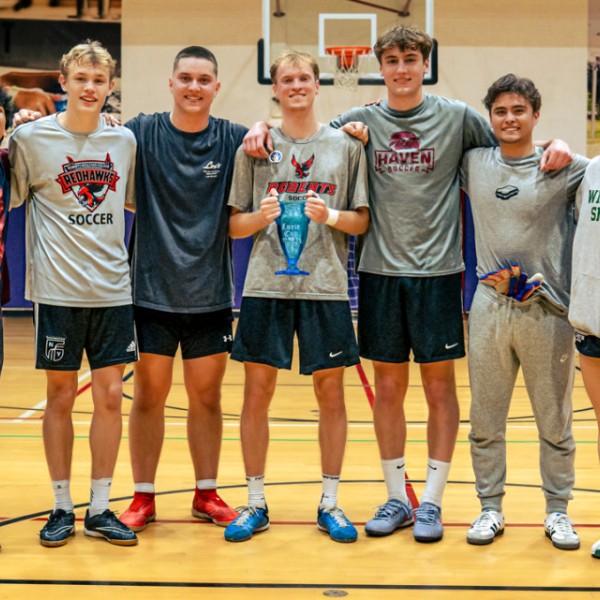
Jeffrey Xue ‘27 has a conundrum. Sustainable, feasible, positive impact seems out of reach. The question prods many Global Development students — for Xue, it arose during an engaged learning experience with a major packaged food company.
“Going through one of their plants and seeing the pot pies racing by — I was like, this is really cool, these pot pies are going to end up helping to feed someone.” The sense of purpose faded after walking around the corner where massive blocks of shortening filled the input hoppers. “Someone’s going to eat that. You look at the nutrition, and it's a complete disaster.”
Later that summer, Xue leaned into the social side of his food systems passion through a Lund Fellowship with the Syracuse Refugee Agricultural Program. There, he launched a new herb garden, and in spare hours lent an extra set of hands processing garlic or harvesting tomatoes with other ongoing projects. Each week at the farmers market, Xue contextualized his work among miniscule profit margins and long, 6 AM SNAP/EBT token exchange lines.
“I left with more questions than I went into the experience with.” For Xue, research was breaking through a flowery worldview and balancing realism. Tough? Yes. Worth it?
“I would absolutely do it all over again.”

Vivian Yellen ‘27 also dove into research for personal clarity. Looking to develop different analytical skills, Yellen acquired a Laidlaw Fellowship to explore her interests in natural resource policy. She found the zenith of her intrigue in the relationship between political stability and the nationalization of extractive industries. Through a Google search, Yellen found a Cornell professor with a nearly exact match to her interests in Chilean lithium policy. Then, it was only a matter of reaching out to secure the mentorship of Kenneth Roberts.
“My friends were all skeptical, like ‘You’re cold emailing, no professor is going to say yes,’ but [Roberts] was so kind, like ‘Yes, I want to help.’”
Yellen’s research was highly independent. “This was my project. I’m not going to sugarcoat and say it wasn’t hard to keep myself on track. But it was really great to talk to Dr. Roberts and get his advice on how to approach my research interests.”
That independence led her to reconceptualize her undergraduate education in learning targets. She’s diving into courses on statistics and geospatial mapping to fill skill gaps she found over the summer. Yellen is taking her growth into her own hands after the biggest takeaway of her fellowship:
“I’ve learned that, as an undergraduate, I can do research that has an impact.”

Lea Hostetter-Habib ‘27 has a clear idea of where she wants to land post-graduation, and it’s not academia. Still, she sees her research with Rachel Bezner Kerr as a valuable way to develop holistic skillsets for a future in the non-profit space.
“I think that work at non-profits and in academia go hand-in-hand, so I think I have to understand how research is done, and the validity behind different development initiatives.”
Hostetter-Habib is working under Bezner Kerr with Soil, Food, and Healthy Communities of Malawi on their gender transformative approach to agroecological practices.
Like Yellen, Hostetter-Habib found her research position through a cold-call. She says a prior research opportunity lent her the confidence to pursue a position with Bezner Kerr: “I think without my research experience, I would have been a lot more intimidated to reach out.”
Hostetter-Habib hopes her current research will lend way to an honors thesis. For now, she’s building tactical skills like software proficiencies and enjoying the rich expertise of Global Development faculty.
“They’re not just teaching about these subjects,” Hostetter-Habib said of her professors within the department. “They’re actually making a difference.”
With her research, Hostetter-Habib feels she’s in the early footsteps of a similar road.
“I'm learning so much that I wouldn't have necessarily learned in my classes. And I can really tell that it is making change, it is real research.”

Grace Dorward ‘26 enjoys her hands-in-the-dirt agriculture courses. As a sophomore, she found herself looking for an equally hands-on experience in surrounding topics — food security, gender roles, and policy — that are harder to touch.
She found an opportunity for involved, macro-level insights with Food Systems and Global Change, a research group housed in Global Development. Dorward works on a team that is developing a literature review on gender nuance across food systems.
This type of birds-eye view research may, at first, seem like a far cry from hands-on. But Dorward says her discussions with the team help her stay engaged and see the impact of her work. “It's hard to see the outcomes of your papers, but on a day-to-day basis, you definitely see we're gaining more knowledge.”
For Dorward, research is a route to enhancing her validity as a student and pre-professional.
“I feel like if you're going to talk about something, you should know what you're talking about, and you should have some sort of connection to it. I wanted to have that firsthand knowledge.”

Amy (Yurim) Nam ‘27 isn’t just interested in research, she’s interested in making research happen. Nam is one of the few social science students on the Cornell Undergraduate Research Board (CURB)’s executive body. She emphasizes intersectionality in her work with the board. Last semester, Nam brought in Global Development’s Mario Herrero to a dialogue typically dominated by pre-medicine biology topics.
“We perceive ourselves [as] a medium between students and professors,” Nam said of CURB. She pointed out that professors look for undergrads just as undergrads look for professors. CURB fosters those links: “It’s about building connections and fostering networks.”
Nam first found CURB for its friendly community, and the organization’s capacity training gave her the confidence to pave her own research path. Last semester, Nam secured a research assistantship with Global Development PhD candidate Seongmin Shin via a cold email. Now, under Shin’s practice-built guidance, she’s exploring participatory gaps between Ugandan smallholder farmers in the carbon market.
CURB hosts a peer mentorship program, and Nam encourages undergrads to apply to the organization’s executive board. Like Xue, Yellen, Hostetter-Habib, and Dorward, Nam’s research experience catalyzed how she sees the topics she’s passionate about.
“You never know how things are really interconnected before you can try it out.”
Lauren Chuhta ’26 is a student writer and co-president of the Student Advisory Board in the Department of Global Development. She is a double major in Global Development and Communication.
Discover more about the Global Development major at Cornell

Keep Exploring

News
Rohan Amin's Lurie Cup soccer tournament brings people together from Cornell and around New York state to support the pediatric hospital that saved his life.
- Global Development

News
Communities tracked by AARP's Livability Index made progress becoming more age friendly, but housing affordability and health care access remain challenges.
- Global Development

We openly share valuable knowledge.
Sign up for more insights, discoveries and solutions.


